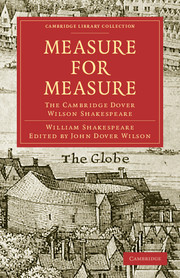TIME-ANALYSIS
Published online by Cambridge University Press: 07 September 2010
Summary
Shakespeare has a reputation for carelessness in his treatment of time, but the contradictions and confusion in the references to time in the present text are so glaring as to be only explicable, in our judgment, on the theory of a series of revisions. It has been thought best to collect all the evidence on the matter under the head of a single note, which is indebted to P. A. Daniel's analysis (New Shak. Soc. Trans. 1877–9, Pt II), though we have departed from it in some important particulars.
Day I. 1. 1. The Duke takes his leave, gives Angelo and Escalus their commissions and departs. ‘A short interval must here be supposed, to allow the new governors to settle to their work’ (Daniel).
Day II. 1. 2. The proclamation has been issued. Claudio and Juliet arrested. Lucio goes to seek Isabella.
1.3. The Duke borrows his disguise from Friar Thomas. This scene suggests that Day ii follows immediately upon Day i. Possibly it originally stood as 1. 2.
1. 4. Lucio interviews Isabella. N.B. Isabella has only just arrived at the nunnery; it is therefore the same day as 1. 2., where Claudio remarks ‘This day my sister should the cloister enter’ (l. 173). Isabella goes at once to see Angelo, and promises to let Claudio hear of her success ‘soon at night.’
2. 1. Before II o'clock in the morning (v. l. 271); yet the houses in the suburbs, which were only threatened in 1. 2. 93, have already been plucked down, and Mistress Overdone has even had time to set up a new establishment: ‘whose house, sir, was, as they say, plucked down in the suburbs: and now she professes a hot-house’ (ll. 62–4).
- Type
- Chapter
- Information
- Measure for MeasureThe Cambridge Dover Wilson Shakespeare, pp. 157 - 159Publisher: Cambridge University PressPrint publication year: 2009First published in: 1922

